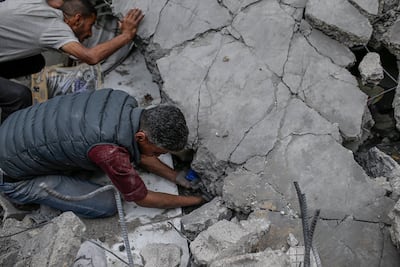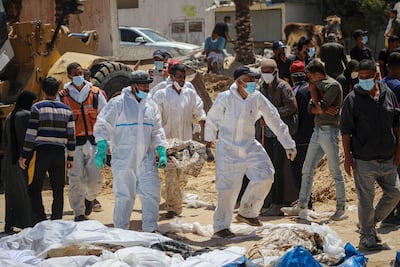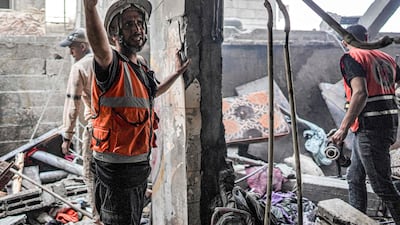Live updates: Follow the latest on Israel-Gaza
Civil defence units in war-ravaged Gaza are struggling to retrieve more than 10,000 bodies of Palestinians believed to be buried under the rubble of hundreds of homes destroyed by Israeli fire, almost seven months after the devastating conflict broke out.
According to local health authorities, more than 34,500 people have been killed in Israel's war in the coastal Strip since October 7, when the militant group Hamas and other factions attacked Israel, killing around 1,200. Thousands more missing people are also thought to have been killed.
“We estimate that there are more than 10,000 missing individuals still under the rubble of hundreds of destroyed buildings since the start of the aggression,” Mahmoud Bassal, spokesman for the civil defence in the northern Gaza Strip, told The National on Wednesday.
“Despite our struggle with significant shortages and deficiencies in equipment, vehicles, and machinery necessary for searching for the missing, the civil defence continues to fulfil its humanitarian duty towards the people of Gaza,” he added.

Mr Bassal accused Israeli forces of destroying, from the early days of the war, heavy machinery and excavators, leading to the “loss of thousands of lives” because people could not be reached and rescued from beneath the piles of rubble.
In recent weeks, as the intensity of the war dropped, his teams have received numerous requests from families and volunteers for help to retrieve bodies from residential buildings that were destroyed months ago.
“Days ago, we began these tasks in the northern governorate of Gaza with the support of local residents and volunteer teams using simple manual tools,” explained Mr Bassal.
“Despite the decline in manpower, scarcity of resources, and complete absence of heavy machinery necessary for this purpose, we managed to retrieve several martyr bodies, which had fully decomposed.”
Two to three years
However, Mr Bassal warned that without modern excavation machinery, using primitive methods, such as simple tools and hand searching, would take two to three years, potentially resulting in a health and humanitarian catastrophe for the population.
Mohammed Abu Obaid asked civil defence units to help retrieve the bodies of his relatives who remained under the rubble of their home weeks after it was struck, in northern Gaza city.
Immediately after it was hit, there was no possibility of retrieving or searching for bodies. A few days later, Israeli forces arrived in the area and no one could reach the house until they withdrew.
“A few days ago, civil defence teams, in collaboration with youth organisations, began excavation operations to search for the family members' bodies under the rubble, including some close to me with whom I lived the best days of my life,” Mr Abu Obaid told The National.
“It's a very difficult feeling to know that your loved ones and family members are decomposing without being properly buried,” he added.
By some estimates, as of April 5, between 50 and 70 per cent of Gaza's housing has been destroyed or seriously damaged.
According to a recent report by the World Bank, about $18.5 billion will be needed to rebuild the Gaza Strip. It said that the estimate was likely to rise once assessments could be made inside the enclave.
“The search for bodies is not easy and requires time and effort,” said Mr Abu Obaid. “Whenever they find a body or catch a glimpse of it, they try to handle it slowly to extract whatever remains intact.”
“Honestly, as a family, we feel relieved by this step because, at the very least, we will have a grave for our children to visit from time to time.”



